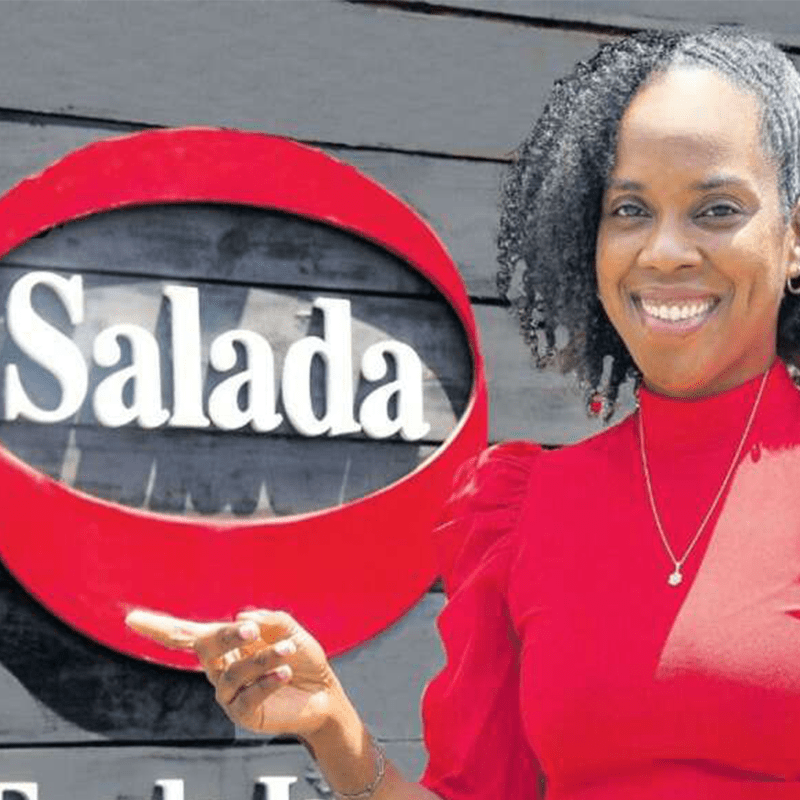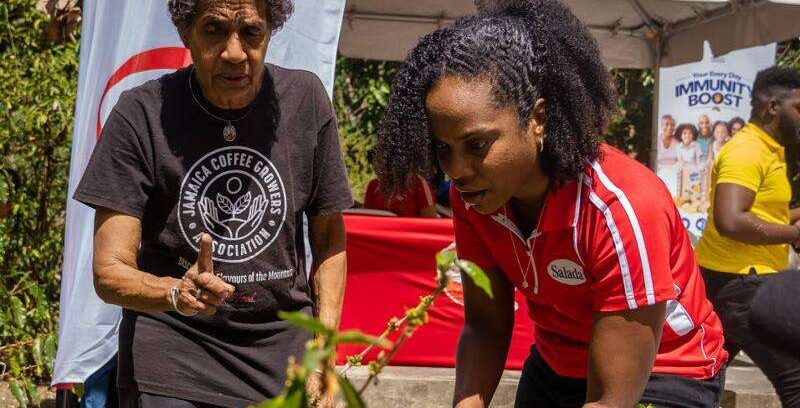‘Give us a seat’

Salada boss calls for collaboration on growing coffee industry General Manager of Salada Foods Tamii Brown said her company is refocusing to push its products deeper into both the local and export market, but said that ambition is stifled by inadequate supply of coffee from farmers in Jamaica. Salada Foods processes mostly coffee but has branched out into ginger and ginger-turmeric products. Brown, who did not offer a growth target either locally or internationally for her company’s products, citing that “it is more complex than that”, however said if she is to attain the potential of Salada Foods the company must have a seat at the table of decision-makers when policies are developed for the coffee industry. “When we talk about the fact that Salada and Jamaica are actively looking at improving our exports…we have to look at where our export growth is going to come from,” Brown told the Jamaica Observer in an interview last week. “You cannot break into export without having a product that is competitive on a global scale. You can’t come in and say, ‘Because I have a Jamaican stamp on a product… all consumers are going to come and rush to it and be able to pay a premium price.’ No, consumers are more discerning that,” she continued. She explained that with the regulators stipulating that at least 30 per cent of all coffee blends must have Jamaican coffee, whether high mountain or Blue Mountain, the company is stifled because the quantities are not available. “How do processors survive in the medium term when regulations are put in place that cannot be complied with?” she asked rhetorically. “I think that we need to operate just like all other industries. In the immediate term we need to look at some supplementing of supplies…,” she continued. “There are times where — maybe because of inconsistency of supply, maybe because of straight out unavailability of supply — it becomes very challenging for processors to meet that requirements.” Brown, however, said she is not calling for any wholesale opening up for coffee imports, but is looking for collaboration in terms of the solution. “We want a seat at the table. As the only processor of instant coffee in the island, what we want our regulators [to do] is point us in the direction [of a solution]. Salada Foods is a guaranteed purchaser of coffee in Jamaica.” he said the long-term solution is growing more coffee, pointing out that her company has engaged farmers through the Jamaica Coffee Growers Association to help to boost yields. For now though the company is engaged in innovation, developing new products, and targeting new markets. At 65 years old Brown said it’s very easy for companies like Salada, which have legacy brands and mature brands, to get comfortable and complacent. “However, you have to remember: Just like how time evolves, you have a target consumer base that also evolves — and if we as a company don’t keep up to date with that evolution, the company will not swim. And I think that sitting in the seat as general manager, that reality has really come to the fore. What will Salada have to do now to safeguard the next 65 years?” To swim, the company has been innovating with the introduction of new products. At the height of the COVID-19 pandemic it introduced ginger powder and ginger-turmeric powder to the portfolio. Brown said both did well and continue to do well, with Jamaicans getting more health conscious. The company also added flavoured coffee to the line-up with the introduction of coconut cappucino, caramel, and cinnameg coffees to cater to the tastes of a new generation. “We have some new things coming out very shortly,” she said but declined to tell the Business Observer what those products are. Turning to growth, she continued, “You can grow it by adding new products but then you also grow by filling in the distribution holes, so that’s kind of where we are for the domestic market.” Brown also declined to give a breakdown of the share of Salada’s products which are exported versus how much remain in the domestic market, though she admitted the domestic market accounts for “the lion’s share of sales”. “What we’re doing this year, which I will share with you, is that we are looking at the Caricom footprint, just trying to keep close in our neighbourhood, and we have been making some significant breakthroughs as it relates to our current progress.” Brown said the company’s products are “barely in Caricom”, adding, “We were previously in a few markets. You would find us in British Virgin Islands, you would find us in Bermuda and Cayman, [but] they were just sprinklings. We never took it on aggressively.” She however said the company is seeing the region as a “significant area for growth”. “We’re going into Antigua. We already are in Barbados; what we’re looking for [is to] define our base in Barbados. And we’re also looking to St Lucia.” Salada Foods sent its first shipment of products into Antigua just last week. On the export side, the US is Salada Foods’ biggest market outside of Jamaica. “A lot of times somebody would say, ‘Yeah man, I am in the US.’ But what does that really mean when you said that you’re in the US? Sometimes when you talk about getting into an export market, maybe [it’s] just one account that you’re in. When Salada says that we are in an export market, that’s not what we’re talking about; we’re talking about our presence should be as good as our domestic market or even better. So it does require that we work on markets just like what we worked on here so we speak to our customer accounts and we make sure that our presence is strong in each of these accounts. And though she said the products are doing well in the US, Brown added, “I don’t think that we’re scraping the surface of those markets. And
Grounds for Growth initiative gives small coffee farmers boost

Salada Foods Jamaica and the Jamaica Coffee Growers Association (JCGA) joined forces to launch a coffee sustainability initiative — Grounds for Growth. The initiative focuses on repurposing Salada’s manufacturing bi-products into optimal organic fertilising material to cost-effectively improve the yield of local coffee farmers. The Grounds for Growth initiative launched with a hands-on workshop on a coffee farm in Cedar Valley, St Thomas, on Friday, March 10, 2023. The group of local small farmers participated in interactive demonstrations on sustainable farming practices, including composting using spent coffee grounds for improved yields. “We learned a lot of things like how to test soil and how to make organic fertiliser using coffee grounds and other organic material,” explained a local small farmer Kemar O’Connor. Organic farmer and Jamaica Coffee Growers Association (JCGA) Vice-President Dorienne Rowan-Campbell emphasised that, “our innovation activity provides training for younger farmers in what we call our generation next project. This is important because, if we don’t reach the younger farmers, we won’t have any coffee.” “This workshop is the beginning of something great to come in partnership with Salada,” asserted JCGA President Donald Salmon. The collaboration of Salada and JCGA on Grounds for Growth was a natural one given their shared commitment to the development of the local coffee industry. Salmon outlined that farmers faced several challenges including access to education on best practices. “Farmers need to understand that it is not how much land you have, but how efficiently you use that land,” he added. “We are experimenting: Salada, the University of the West Indies, the University of Technology. We are exploring how we can use spent grounds to reduce the cost of fertiliser, reduce the cost of input to the farmers, and show them new ways of doing things.” Salada Foods Jamaica General Manager Tamii Brown is optimistic about the partnership and the impact it may have on the viability of the local coffee industry. “Salada Foods is one of Jamaica’s largest coffee processing plants, and we are acutely aware of the challenges coffee farmers face in cultivating this beloved agricultural product. The viability of the industry requires innovation, collaboration and action. We have joined forces with the JCGA to explore innovative ways the coffee bean can offer growth from the farm to the processing plant and then back to the farm. Through this collaboration, we will support a cleaner, greener Jamaica where coffee farmers, in particular, spend less to nourish their farms and enhance the quality and quantity of production,” Brown confirmed. Local supply permitting, Salada processes instant coffee three to four times each year. At each process run, the Salada plant generates, as a bi-product, 240,000 pounds of spent grounds on average. Salada is the only local entity producing spent coffee grounds at scale for the farming community. Prior to the Grounds for Growth Initiative, Salada spent well over $1 million per process run on disposal for spent coffee grounds —from plant removal, to gathering, to transportation and discarding. To facilitate the Grounds for Growth initiative, Salada engages in additional activities including drying, bagging and delivery. Though more costly, using the grounds for compost fertiliser brings remarkable benefits for all concerned. Farmers can ethically and cost effectively substitute imported chemical fertilisers with locally sourced, organic spent grounds in compost for fertiliser. With immediate effect, through the JCGA, the farmers can purchase a 100lb bag of spent grounds for $850.00 while stocks last. The delegation at the free, all-day workshop also included representatives from the University of Technology, Jamaica Agricultural Commodities Regulatory Authority, the Tourism Enhancement Fund, and the St Thomas Jamaica Agricultural Society. Salada Foods Jamaica has been a proud Jamaican coffee processing industry member since 1958. The Kingston-based manufacturer is the only soluble coffee processing plant in the English-speaking Caribbean. Under its flagship brand Jamaica Mountain Peak, Salada Foods continues to provide tasty, convenient coffee products at an affordable price for consumers on the go. The recently launched Jamaica Mountain Peak 3in1 flavoured coffee trio: Cinnameg, Caramel and Coconut Cappuccino are now available in stores islandwide. Source: Jamaica Observer
Tamii Brown, General Manager of Salada Foods Jamaica Limited

Tamii Brown is an outcome-oriented individual with over 17 years of experience in marketing, leadership and export management and is the current general manager of Salada Foods Jamaica Limited. Brown holds a bachelor of arts in communication studies and Spanish (cum laude) from York University and an MBA from the University of the West Indies. “Blessed with the opportunity to serve at the helm of one of Jamaica’s leading manufacturing companies, I strive to create a space where voices adding value are heard and not overshadowed. At work, I encourage collaborative decision-making, multi-level team huddles and maintain a strict open-door policy. Women are underrepresented globally in the manufacturing industry. Gender diversity can never be understated – it is a core ingredient for innovation. Future-proofing the local manufacturing industry requires us to innovate and to challenge the norms, as needed,” she shared. “Men and women are neither better nor worse… we are just different. One example is we tend to listen differently. Our recent product innovations – the flavoured coffees – were a direct result of listening to our consumers. Our women-led innovation and marketing teams were in tune with consumer needs, open to candid feedback, and were empowered to formulate an innovative product line to the ultimate delight of our consumers.” Source: Observer